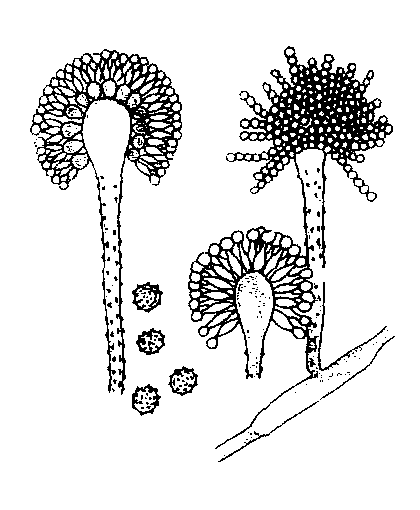黄曲霉huangqumeiAspergillus flavus
真菌门、子囊菌纲、曲霉属。腐生菌。菌丝疏松,表面黄绿色,背面无色或略呈褐色。菌丝多分枝,具隔,无性生殖发达,无性生殖时产生大量的分生孢子梗,梗端膨大成球形的泡囊,在泡囊表面又生出呈放射状排列的小梗,每个小梗顶端产生成串的分生孢子,呈黄绿色。由于其有性生殖极少见,所以也常将黄曲霉归入半知菌纲中。黄曲霉分解有机物的能力很强,常用黄曲霉的一些菌系作为酿酒、做酱、制醋的菌种,和生产淀粉酶和蛋白酶。但是有些黄曲霉菌株能产生黄曲霉毒素,可引起人、畜和禽类的肝脏致癌。黄曲霉毒素尤以在发霉的花生中含量较高,估计全世界每年有10万多只禽、畜死于黄曲霉中毒所致(详见“黄曲霉毒素”条)。
黄曲霉Huang qu mei
是半知菌类丛梗孢目曲霉属的真菌。菌丝有横隔,为多细胞。进行无性生殖时,形成大量分生孢子梗,梗顶端膨大成顶囊,通常为球形或棒形。顶囊表面以辐射状生出单层或双层小梗,小梗顶端着生成串分生孢子。孢子从黄色变成黄绿色。分生孢子梗基部有一足细胞,细胞壁较厚并与营养菌丝相连。自然界分布广,多生于食品、腐烂水果及潮湿衣物上。黄曲霉群分解淀粉能力强,是发酵工业上的重要菌群,能产生淀粉酶、蛋白酶、果胶酶等酶制剂。产生的曲酸可用作杀虫杀菌剂。某些菌系能产生黄曲霉毒素,特别在花生或花生制品上更易形成,引起人畜中毒死亡和人类癌症。因此在生产中选用菌种时要注意检查。

黄曲霉
黄曲霉Aspergillus flavus
真菌门子囊菌纲(或归入半知菌纲)。曲霉属中的一种常见腐生真菌。在发霉粮食、粮食制品或其它发霉的有机物上最为常见。菌丝生长较快,排列疏松,表面黄绿色,背面无色或微有褐色。菌体的营养菌丝分隔、分枝,无性生殖时,气生菌丝的一部分形成长的分生孢子梗,梗端产生近球形的泡囊顶囊,囊的表面又产生许多小梗,小梗上着生成串的黄绿色球形分生孢子。分生孢子梗、泡囊、小梗和分生孢子合成孢子头。黄曲霉分解有机物的能力强,可用于生产淀粉酶、蛋白酶和磷酸二酯酶等,也是酿酒、制醋、做酱时常用的菌种。但有些黄曲霉的菌株会产生引起人、畜肝脏致癌的黄曲霉毒素,或称“肝毒素”。特别是在发霉的花生中含量较高。黄曲霉毒素的毒性很强,比致癌物质“二甲基亚硝酸”的毒性高75倍。1960年,英国曾发生火鸡场的饲料中因含有黄曲霉毒素,火鸡食用后,7天左右均死亡。经尸体解剖检查,发现肝脏出血坏死,胆囊淤血,肾肥大。黄曲霉毒素也会引起人类死亡。玉米、花生、大米、花生油的感染率很高,其它的食用油、豆类、发酵食品也能感染。做饭、做粥前要把米粒多冲洗几遍。油燃烧时加入食盐,其中的碘可破坏毒性成分。霉变发酵食品不可再食用。